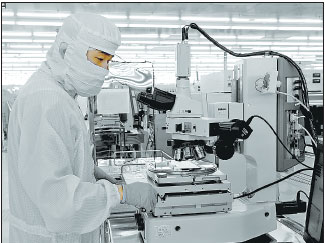Third phase of growth focuses on upgrading and restructuring
The Xi'an Hi-tech Industries Development Zone is embarking on a new development round of "entrepreneurship" and working to build itself into a world-class scientific and technological zone, according to its administrative committee.
The zone in Xi'an, capital of Northwest China's Shaanxi province, has become a model of innovation-driven development in the city and even Shaanxi over the past 26 years, local officials said.
Beijing-based China Science Daily reported that the year of 2012 is the 20th anniversary of national high-tech zones' construction and development. The decades can be divided into two periods - the first development round in the first decade, focusing on transformation from a planned economy to a market-driven one, and the second round in the last decade, featuring modern governance of the zones and enhanced market role in their operation.
Amid the new technology revolution worldwide and a variety of global challenges, the current third phase, proposed by the Ministry of Science and Technology, will require the national-level zones to grow increasingly aware of their commitments to increase innovation capacity, restructure industries and growth and create a resource-efficient and eco-friendly society.
The zone in Xi'an is among the first national high-tech zones approved by the State Council in June 1991. During the first development period, the zone centered on aspects such as infrastructure construction, technological innovation and attracting investment. It promoted industrial scale, new development models and internationalization during the second development period.
The zone hopes to attract globally influential innovative enterprises by offering excellent mechanisms and policy support and building itself into an area of innovation-driven development, mass innovation and entrepreneurship.
During the third development period, the high-tech zone plans to lead Xi'an in scientific and technological innovation, finance, software development and military-civilian integrated industries.
As for the software industry, the high-tech zone wants to focus on next-generation information technologies such as cloud-computing, big data, augmented reality and virtual reality to attract information service companies and professionals, according to the development plan.
Xi'an is among the first cities in China to develop the augmented reality and virtual reality sectors. It is home to nearly 100 startups in the field. The high-tech zone hosted the first Augmented World Expo Asia in 2015 and, together with related organizations, founded China's first international augmented reality industry center.
Zhu Liming, deputy director of the Xi'an software park development center, said: "Xi'an boasts advantages in technology and professionals and will definitely become a leader of the augmented and virtual reality sectors."
The high-tech zone will also carry out eight big projects, including some industry funds worth a combined 10 billion yuan to advance development of strategically emerging sectors, six characteristic towns, infrastructure improvements and public services.
Biological medicine is another focus of the high-tech zone, which will mainly promote chemical pharmaceuticals, modern Chinese traditional medicine and medical instruments.
The zone plans to establish a complete industrial chain involving research and development, production and sales. The biological medicine industry's output value aims to surpass 100 billion yuan.
The zone will set up a comprehensive financial services system for science and technology. It will attract financial organizations, such as insurance and venture capital companies, and hopes to become a national financial center.
songmengxing@chinadaily.com.cn
|
|
(China Daily 04/06/2017 page7)















